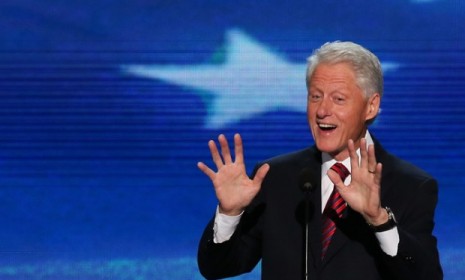Are Democrats better than Republicans at creating jobs?
Bill Clinton boasts that over the past 52 years, 18 million more jobs were created on the watch of Democrats — but don't credit liberal policies just yet

A free daily email with the biggest news stories of the day – and the best features from TheWeek.com
You are now subscribed
Your newsletter sign-up was successful
Bill Clinton threw out a lot of statistics during his well-received speech at the Democratic National Convention, but none turned more heads than his assertion that Democratic presidents have created 18 million more jobs than Republicans. "Since 1961, for 52 years now, the Republicans have held the White House 28 years, the Democrats 24," Clinton said. "In those 52 years, our private economy has produced 66 million private-sector jobs. So what’s the jobs score? Republicans 24 million, Democrats 42 [million]." Politicians are known to stretch statistics to fit their needs, and Clinton's numbers, at first blush, just seemed too lopsided to be true. But fact-checkers across the board agree: The statistic is solid. Here, a guide to Democrats' whopping advantage in the jobs score:
Clinton didn't fudge the numbers at all?
No. Tracking job statistics from the month a president took office to the month he left, Democratic presidents from John F. Kennedy to Barack Obama oversaw the creation of an average of 150,000 private-sector jobs per month, compared with 71,000 a month for Republican presidents. And if you take other factors into account — such as discounting a president's first year, since his own policies likely haven't taken effect — Democrats still come out on top by healthy margins.
The Week
Escape your echo chamber. Get the facts behind the news, plus analysis from multiple perspectives.

Sign up for The Week's Free Newsletters
From our morning news briefing to a weekly Good News Newsletter, get the best of The Week delivered directly to your inbox.
From our morning news briefing to a weekly Good News Newsletter, get the best of The Week delivered directly to your inbox.
Which presidents fared best?
Clinton — somewhat uncharacteristically — didn't mention that his presidency accounted for an astonishing 50 percent of the Democrats' score. Ronald Reagan was the main driver of job growth for Republicans, overseeing 60 percent of their job gains over these 52 years.
Why the big difference?
Clinton ascribed Democrats' economic success to their policies and governing philosophies. "It turns out that advancing equal opportunity and economic empowerment is both morally right and good economics," he said. "Why? Because poverty, discrimination, and ignorance restrict growth." Many liberals agree, and think the stat should be a staple in Democratic pitches. "Why why why why why haven't Democrats spent years pounding this home?" says Michael Tomasky at The Daily Beast. "This should be the first talking point out of the mouth of of every Democrat who ever goes on TV to discuss anything."
A free daily email with the biggest news stories of the day – and the best features from TheWeek.com
But isn't it more complicated than Clinton claims?
Yes. "It's probably fallacious to simply ascribe the economy's strong performance under Democrats to Democratic policies, and vice versa," says Rick Newman at U.S. News & World Report. "Economic policies take years to filter into the real economy," and it's possible that Reagan's policies set the stage for the economic boom years during the Clinton administration. Furthermore, party identification isn't a reliable gauge. "The policies of Republican Richard Nixon, who by today’s standards would be considered a liberal on domestic policy, reflect little of the positions of today’s Republican Party," says Glenn Kessler at The Washington Post. And the truth is that presidents don't actually have that much influence over the economy. Some would argue that it's mere luck that Clinton was sworn in just as the tech industry took off.
Still — isn't this good news for Democrats?
"The irony is obvious," says Newman. "Republicans are considered the business-friendly party, while 'tax and spend' Democrats are regarded as redistributionists eager to transfer wealth from those who have it to those who don't." The lazy stereotype doesn't hold up against the numbers.
Sources: Bloomberg, CNN, The Daily Beast, The Huffington Post, PolitiFact, ThinkProgress, U.S. News & World Report, The Washington Post
Read more political coverage at The Week's 2012 Election Center.